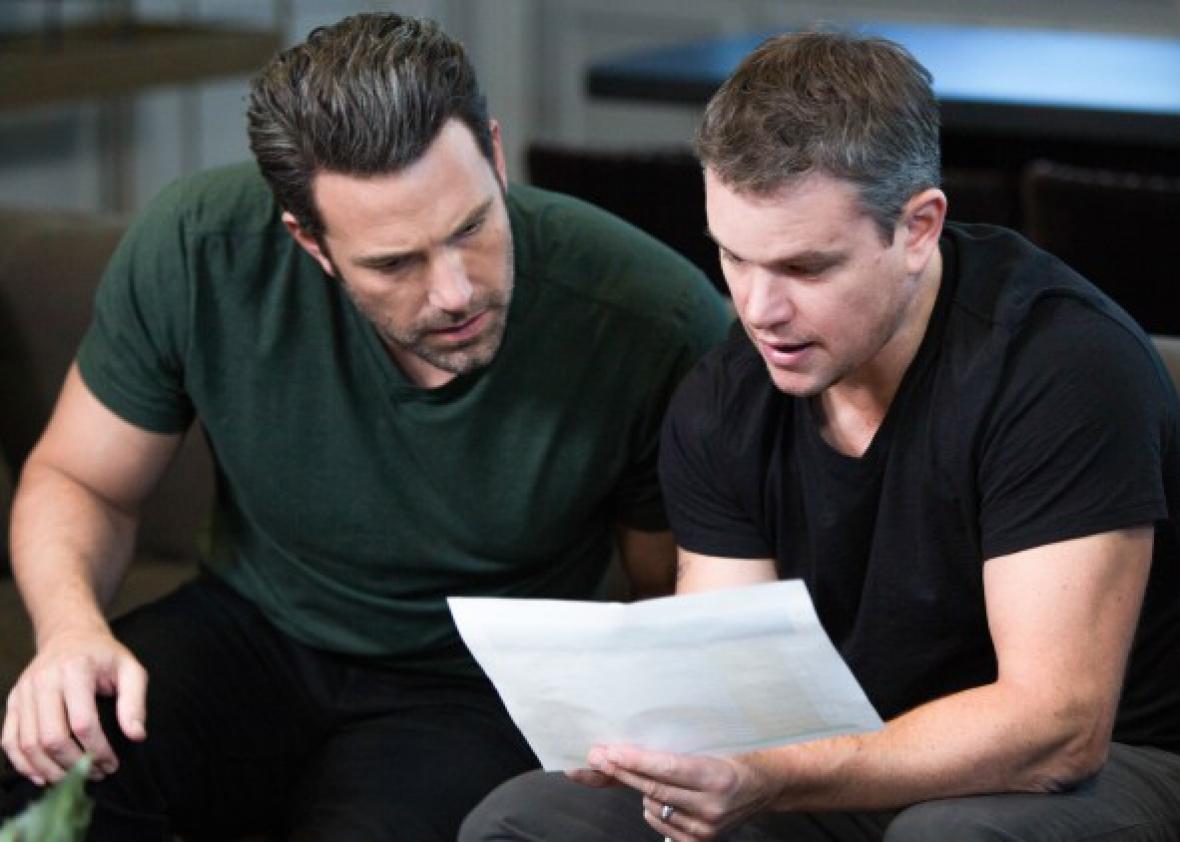In the past few years, the discussion around how to make the entertainment world more diverse onscreen and off has grown louder—a refreshing and very necessary development. But as study after study is released, it’s clear that actual change within the industry has yet to catch up to all of the talk. And now Sunday night’s Season 4 premiere of Project Greenlight offered a unique chance to see, in action, one of the many reasons the diversity push has moved at such a slow pace behind the scenes.
The Matt-Damon-and-Ben-Affleck–produced reality show, in which new and emerging filmmakers are given a chance to direct a feature, is back on the air after a decade-long hiatus. As the premiere begins, Damon and Affleck, along with other producers and mentors—this time around it’s the Farrelly Brothers, who also found the script that’s getting made into a movie—sift through submissions and narrow down their top 13. (It was supposed to be their top 10, but they couldn’t choose.) The finalists are a fairly diverse group, and include two sets of male-female directing duos, one of which is made up of a white woman and a Vietnamese man, Kristen Brancaccio and Leo Angelos.* During their interview with the judges, Kristen discusses her thoughts on the script, in which Barry, who is unexpectedly dumped on his wedding day, marries a prostitute named Harmony:
“One thing that whoever directs this should keep in mind, is that it’s important that Barry makes the judgment on Harmony, but the film doesn’t make the judgment on Harmony, because it can very easily go the route of slut-shaming.”
Leo then acknowledges that he’s grateful to have Kristen as a partner, admitting that had he been working on such a script alone, he might not have thought about that dynamic. It’s a great demonstration of why different voices are needed in the room, affirmed even more so by the sole black producer in the room, Effie Brown, who nods her head in fervent agreement.
Later, however, things get a little awkward. As the judges discuss who will be chosen to direct, Damon and Affleck announce their personal top four—all of whom are white and male. Brown, unsurprisingly, is pulling for Leo and Kristen, but Peter Farrelly says he can’t envision them directing the script.* “I would just urge people to think about whoever this director is, the way that they’re going to treat the character of Harmony, her being a prostitute,” Brown counters. “[She’s] the only black person, being a hooker who gets hit by her white pimp.” She cautions them to be conscious of who they pick to execute such a touchy script.
Damon’s response, while admitting that there are problems with the character of Harmony as written: “When you’re talking about diversity, you do it in the casting of the film, not the casting of the show.”
It’s an unfortunate, but familiar sentiment in Hollywood, where many in power on all levels of the industry point to the others as the reason for why diversity isn’t getting better. Damon doesn’t make his point sound any nicer when he says he’s glad Brown flagged the issue for them, “but ultimately it changed the rules of what the competition is about.”
Maybe Leo and Kristen weren’t really right for the project—but that’s not the point. Brown’s prodding of the issue is exactly what is needed in rooms like these. Regardless of who they wound up choosing—and yes, it turned out to be a white guy—hearing Damon’s dismissive reaction to being made aware of his unconscious biases is more than a little disheartening, and, just as unfortunately, unsurprising.
*Correction, Sept. 14, 2015: This post originally misspelled Kristen Brancaccio’s first name. It also misstated that Peter Farrelly wrote the script. The Farrelly brothers found the script, which was written by an unnamed comedy writer.
